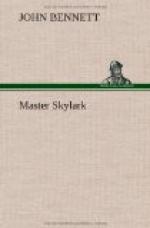A lump came up in Nick Attwood’s throat. “But what hath he done to thee, Cicely, and where is thy pretty gown?” he asked, as they hurried on through the crooked way; for the gown she wore was in rags.
Cicely choked down a sob. “He hath kept me locked up in a horrible place, where an old witch came in the night and stole my clothes away. And he says that if money doth not come for me soon he will turn me out to starve.”
“To starve? Nay, Cicely; I will na leave thee starve. I’ll go with thee wherever he taketh thee; I’ll fend for thee with all my might and main, and none shall harm thee if I can help. So cheer up—we will get away! Thou needst na gripe me so, thou rogue; I am going wherever she goes.”
“I’ll see that ye do,” growled the bandy-legged man. “But take the other hand of her, thou jackanapes, and fetch a better pace than this—I’ll not be followed again.”
His tone was bold, but his eyes were not; for they were faring through the slums toward Whitechapel way, and the hungry crowd eyed Nick’s silk cloak greedily. One burly rascal with a scar across his face turned back and snatched at it. For his own safety’s sake, the bandy-legged man struck up into a better thoroughfare, where he skulked along like a fox overtaken by dawn, fearing to meet some dog he knew.
“Oh, Gregory, go slow!” pleaded Cicely, panting for breath, and stumbling over the cobblestones. Goole’s only answer was a scowl. Nick trotted on sturdily, holding her hand, and butting his shoulder against the crowd so that she might not be jostled; for the press grew thick and thicker as they went. All London was a-Maying, and the foreigners from Soho, too. Up in the belfries, as they passed, the bells were clanging until the whole town rang like a smithy on the eve of war, for madcap apprentices had the ropes, and were ringing for exercise.
Thicker and thicker grew the throng, as though the sea were sweeping through the town. Then, at the corner of Mincing Lane, where the cloth-workers’ shops were thick, all at once there came an uproarious din of men’s voices singing together:
“Three merry boys,
and three merry boys,
And
three merry boys are we,
As ever did sing in
a hempen string
Beneath
the gallows-tree!”
And before the bandy-legged man could chance upon a doorway in which to stand out of the rush, they were pressed against the wall flat as cakes by a crowd of bold apprentices in holiday attire going out to a wager of archery to be shot in Finsbury Fields.
At first all Nick could see was legs: red legs, yellow legs, blue legs, green legs, long legs, strong legs—in truth, a very many of all sorts of legs, all stepping out together like a hundred-bladed shears; for these were the Saddlers of Cheapside and the Cutters of Mincing Lane, tall, ruddy-faced fellows, all armed with clubs, which they twirled and tossed and thwacked one another with in sport. Some wore straw hats with steeple-crowns, and some flat caps of green and white, or red and orange-tawny. Some had long yew bows and sheaves of arrows decked with garlands; and they were all exceedingly daubed in the face with dripping cherry-juice and with cheese, which they munched as they strode along.




